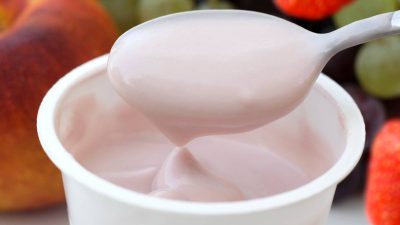The modern food industry is a well-oiled machine with many talents—it’s particularly adept at creating scalable, beautifully presented, and delicious products.
One trick it hasn’t mastered, though, is making healthy products. This is mainly because high-quality, preservative-free foods don’t come cheap, so large manufacturers tend to stick to lower-quality varieties and stuff them full of preservatives so they can keep them on store shelves for as long as possible. Fats and sugars are nearly always prominent ingredients too, which keep consumers coming back for more (and undermine their health in the process).
The rising popularity of health foods has provided another highly lucrative channel for food manufacturers. In many cases, though, they’re not actually making health foods—they’re simply capitalizing on that food’s healthy reputation and making their own unhealthy version of it.
Yogurt is a prime example of this scam in action.
Ancient superfood, modern monstrosity
Don’t take the title of this article the wrong way; yogurt (in the right form) is undoubtedly a powerful health food. It might actually be one of the world’s most ancient superfoods (some historians can trace its roots back 6,000 years).
In its natural form, yogurt is teeming with probiotics, the beneficial bacteria that help maintain the health of your microbiome. As we covered in other articles, the symbiotic interaction between the hundreds of species of bacteria in your gut alone is bewilderingly complex.
We’ve barely begun to form an understanding of it, but we do know this: the microbiome is critically important for the health of entire being. When the microbiome is out of balance, the immune system can’t work properly, the brain falls into dysfunction, hormonal functions go haywire, and more. Taking care of your gut flora is one of the most important steps you can possibly take toward optimizing every aspect of your health.
The potential health benefits of yogurt, then, are not to be underestimated.
Yogurt manufacturers also understand this principle, and so coopted this narrative to boost the attractiveness of their product. There’s certainly nothing wrong with highlighting the virtues of your offering, but here’s the catch: commercial, store-bought yogurt rarely resembles the natural, healthful form of this ancient superfood.
Dannon, Yoplait, and other corporate yogurt brands are pumping out products that are anything but healthy.
Most store-bought yogurt is toxic junk food
The vast majority of commercially produced yogurt is a far cry from its probiotic-rich natural form. It’s probably not surprising to hear that Dannon, Yoplait, and other corporate yogurt brands are pumping out products that are anything but healthy. They’re not the only ones, though—even many of the seemingly healthy and “organic” brands of yogurt are suspect. Here’s why…
They’re made with conventional health-sapping milk. If you’ve read some of our other articles about conventionally produced milk, you already know that it’s bad news. Conventional milk is produced in grossly inhumane fashion, and it’s a hazard to your health—it contains synthetic hormones, pharmaceuticals, and an array of other contaminants. It’s no surprise, then, that consumption of conventional milk is linked to gastrointestinal issues, diabetes, cancer, infertility, and more.[1]
The contamination issues are usually solved when organic milk is used, but that’s just the tip of the iceberg.
They’re full of sweeteners and toxins. As if the health risks of dairy products weren’t bad enough on their own, food manufacturers also use a bevy of questionable substances in the processing of their yogurt. Independent analyses have discovered the presence of dimethylpolysiloxane—a carcinogen used in processing that often ends up in the final product—as well as heavy metals like titanium dioxide.[2] Furthermore, store-bought nearly always contains high levels of inflammatory sweeteners (sometimes even high fructose corn syrup).
They’re pasteurized (i.e. stripped of all living, beneficial components). Almost all yogurt producers (both conventional and organic) are required to pasteurize their final product. This means that they mix bacterial cultures with their ingredients, let it ferment, and then kill the newly thriving bacterial colony through pasteurization!
For this reason, woefully few store-bought yogurt brands actually contain any appreciable level of probiotics— the “Yogurt Report,” carried out by the Cornucopia Institute, demonstrated this fact by testing a wide variety of yogurt brands.[3] And since companies are only required to test probiotic content when the product is still in the factory, they’re allowed to get away with this blatantly false advertising.
Woefully few store-bought yogurt brands actually contain any appreciable level of probiotics
Give your gut flora some real support
You may be able to purchase high-quality, probiotic-rich yogurt if you live near a well-stocked health food store, coop, or farmer’s market. The safest bet, though, is either to source yogurt made with raw milk from a local farmer, or to make your own yogurt at home.
Making your own yogurt is much easier than you might think. Check out this recipe, or read our other article about the full gamut of DIY probiotic foods and drinks.
If you want to make your microbiome even happier, supplement your healthy yogurt habit with lots of prebiotic-rich dark, leafy greens (prebiotics serve as food for your gut flora), and take high-quality probiotic supplements.
References
[1] https://articles.mercola.com/sites/articles/archive/2014/07/22/raw-vs-pasteurized-milk.aspx
[2] http://pubs.acs.org/doi/abs/10.1021/es204168d






